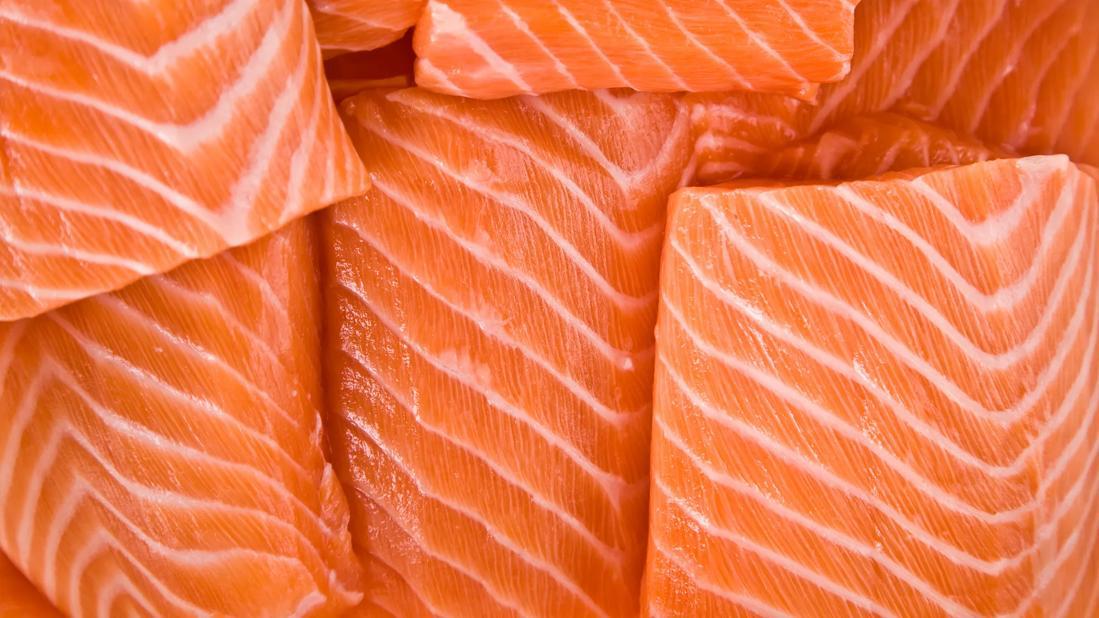6 Reasons Why Salmon Is So Good for You
Eat this fatty fish two times a week to support your muscle, brain and heart health

Salmon’s pink color and rich buttery flavor make it a standout as far as fish dishes go. Luckily, it’s also incredibly good for you.
“Salmon is great for your heart, mental health and muscle mass,” says Julia Zumpano, RD, LD. “Eating it just a couple times a week can help support an active lifestyle and a healthy weight.”
Zumpano shares the many health benefits of salmon that make it worth adding to your plate.
Is salmon healthy?
The type of salmon you eat is either wild-caught or farmed. But due to its popularity and the decreasing amount of this fish in the sea, about 70% of the salmon produced around the world is farmed.
A serving size of 3 ounces of farmed salmon (cooked) provides:
The same serving of salmon also provides these important nutrients:
- 1.2 grams of omega-3 fatty acids
- 2 micrograms of vitamin B12
- 35 micrograms of selenium
- 11 micrograms of vitamin D
- 7 milligrams of niacin
- 1 milligram of vitamin B5
- 214 milligrams of phosphorus
The same amount of cooked wild-caught salmon has fewer calories, less saturated fat and slightly more protein and omega-3.
Health benefits of salmon
In general, fish is a good source of protein, vitamins and minerals — and salmon is no exception. But it brings other specific benefits, too.
“Salmon is especially good for you because it’s high in omega-3 fatty acids and low in mercury,” Zumpano explains. “Mercury may be harmful to humans in high amounts.”
Let’s take a closer look at each of salmon’s health benefits.
Boosts heart health
Omega-3 fatty acids are heart-friendly because they may decrease blood pressure, lower triglycerides and reduce “bad” cholesterol.
“The omega-3s in salmon can protect your heart,” Zumpano says, “especially when it’s eaten as part of a Mediterranean or plant-based diet.”
Enhances brain function
Adding even a small amount of salmon to your diet could help with thinking and memory, or what doctors call “cognitive function.”
“Fish high in omega-3 fatty acids have anti-inflammatory effects and may help with cognitive aging,” Zumpano reports.
Research suggests that eating more omega-3 fatty acids may strengthen your hippocampus, the area of your brain associated with memory and learning. Plus, experts continue to study the effect of eating fish on the progression of dementia and Alzheimer’s disease.
Improves mental health
The U.S. Food and Drug Administration (FDA) recommends eating two servings of fish weekly. But research shows that even one weekly serving of salmon is associated with a lower risk of depression, especially in women.
“Salmon is also high in vitamin D, which research has shown is critical for mental health,” Zumpano notes. “Vitamin D can help with your overall mood and with regulating your sleep.”
Increases muscle mass
Salmon has both protein and omega-3 fatty acids, which are important for muscle development. Research says eating two servings of salmon a week can significantly increase muscle mass (or your total amount of muscle).
“Salmon is a nutrient-packed complete source of protein,” Zumpano says. “It’s a great choice for helping build muscle.”
Lowers cancer risk
No single food can keep you safe from cancer. But studies show that people who eat more salmon increase their protection against colorectal cancer.
More research is still needed, but Zumpano says there’s reason to believe that salmon has protective properties against cancer. It’s high in antioxidants, which can help:
- Prevent damage to your cells
- Reduce inflammation
- Lower your overall risk of cancer
Supports strong bones
One serving of salmon provides more than half the recommended daily amount of vitamin D. While vitamin D isn’t directly responsible for bone health, it helps get calcium to your bones.
“Vitamin D is critical for calcium absorption, bone health and preventing osteoporosis,” Zumpano explains. “Salmon is a natural way to ensure you’re getting enough vitamin D.”
What are the risks of eating salmon?
Salmon is generally safe to eat, especially when it’s fully cooked. But eating it raw or undercooked can raise your risk of illness. The main concerns include parasites and bacteria.
“For most people, though, the health benefits of salmon far outweigh the risks,” Zumpano clarifies, “especially when it’s sourced from a reputable supplier and then properly prepared.”
In other words? Feel free to get hooked on salmon!